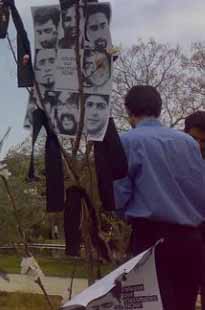| Home > 30 years human rights in Iran > Articles of the Universal Decleration of Human Rights > Everyone Is Entitled to a Fair and Public Hearing | |||
Everyone Is Entitled to a Fair and Public HearingBy Mohammad Rezaie-Vahdati* Article 10 of the Universal Declaration of Human Rights: “Everyone is entitled in full equality to a fair and public hearing by an independent and impartial tribunal, in the determination of his rights and obligations and of any criminal charges against him. As part of our special series focusing on the Universal Declaration of Human Rights, Mohammad Rezaie-Vahdati, a legal expert and journalist, discusses Article 10 of the Declaration. Article 35 of the Iranian Constitution states: “Both parties to a lawsuit have the right in all courts of law to select an attorney, and if they are unable to do so, arrangements must be made to provide them with legal counsel.” However, the Special Court for Clergy (SCC) does not allow defendants to freely choose their attorney. In fact, the accused has no choice but to select a lawyer from a short list approved by the SCC. Elsewhere, a very important and crucial Article in the Iranian Constitution is Article 166, which states: “The verdicts of courts must be well reasoned and documented with reference to the articles and principles of the law in accordance with which they are delivered.” Moreover, this principle is reiterated in various laws, statutes and legislation ratified during the last three decades. However, an overwhelming majority of the rulings issued by the courts and judicial authorities either provide no reason, rationale or explanation for the verdict or the reasons provided have absolutely no basis in logic and are entirely irrational. What kind of justice is this? The other significant issue I want to address -- which I believe is a major impediment to getting Article 10 of the Universal Declaration of Human Rights as well as Articles 35 and 166 of the Iranian Constitution realized and implemented -- is that the judges, prosecutors and the other judicial officials charged with the awesome responsibility of administering justice are quite simply incompetent and lack the proper education, professionalism, ability, character and judgment for the job. It has been my personal experience that many of the judges in civil and “dispute resolution” courts [arbitration?] lack secondary and in some cases even primary education. It goes without saying that they have absolutely no legal training. I also want to discuss these “dispute resolution” courts or councils, as they are called. They have become ever more prevalent of late in Iran and are expanding exponentially. The concept behind the formation of such councils was to try to solve disputes in a way a village or tribal chief would resolve differences in his village or among his tribe -- fairly and amicably. However, the reality is that these “dispute resolution” courts, with their semi-literate judges, are not only unsuccessful in resolving disputes, but in fact they issue harsher sentences (long prison terms), and heavier fines (at times in the millions of dollars) than even official judicial courts. Under the status quo in Iran, Article 10 of the Universal Declaration of Human Rights and Article 35 of the Constitution, which state all people are equal under the law and have identical rights, cannot be realized. How can people have such a right when the necessary tools for it do not exist? How can they exercise their rights when the judges and other judicial authorities who have the most vital and critical role in imparting justice lack the requisite qualifications, training, education or competence? |
|||
 |












